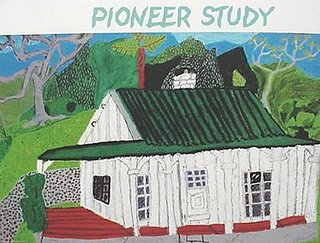
 Teachers seem to spend a lot of time devising intricate systems to 'deliver the curriculum’ to their students to ensure that adequate 'coverage' can be shown.
Teachers seem to spend a lot of time devising intricate systems to 'deliver the curriculum’ to their students to ensure that adequate 'coverage' can be shown.The more detailed they pre-plan such curriculum simply means that whatever the students are interested in is ignored. Teachers, to combat this, sometimes ask their students for questions they want to explore and then ‘design’ a curriculum around such concerns.
More innovative teachers ( brave enough to ignore preplanned units) have the ability to pick up on areas of student interests and are then able to extend such concerns into in depth studies. They are also intuitive enough to be able to provide experiences that they know will tempt their curious students to explore.
Some ‘experts’ say, with the explosion of knowledge, that the process of finding out is now more important that what is being learnt.
All too often these considerations are irrelevant as today many teachers are so overwhelmed implementing imposed literacy and mathematic initiatives (and assessing and recording students’ growth) that they simply have no time and energy to worry too much about the remainder of the curriculum, which is now limited to whatever time is available in the afternoon.
This is shame.
Philosopher Karl Popper talked about three worlds.
The first is the world of things; the second is the world of the inner self; and the third is the world of things created.
Too much learning today is about the second world of processing ideas. At school students process ideas about reading and maths, and other experiences, but seem to produce little lasting meaning – the third world. The walls are full of bits and pieces representing the second world (often produced by the teachers) but in my experience it is hard to find significant expressions of what students have made or created using these processes. And, where you do find it, the students work is shallow and derivatory – all too often clone like lacking creativity, due to an obsessive use of imposed criteria and teacher ‘intentions’. All to often, 'higher order thinking for thin learning'.
Whenever teachers help students develop quality work, in any area, that can be seen or discussed is an opportunity for students to gain insight from others and, most importantly, pride of recognition and achievement.
Classrooms need to be seen as ‘communities of inquiry’ – following up, what one educationalist calls, ‘fertile questions’. Rooms ought to be full of 'rich, real and relevant' studies done rigorously. Exploring ideas is serious fun and should result in all sorts of ’artifacts of the third world’; anything worth doing is doing well.
We need to see our students as: potential scientists, artists, entrepreneurs, writers and dancers etc. Teachers are, in this respect, talent scouts’, appreciating that their students have multiple talents to be discovered and extended.
And such teachers know that not only do their students need to study their questions in depth but that they need to be helped to express their ideas well. This means that choices have to be made but with a whole class involved there are plenty of minds to do the exploring and expressing. The results of this collaborative study (the 'third world') ought to be celebrated on the classroom walls, available through information media, and in their book work.
What we need are creative teachers who, while happy to assist with skills and techniques, understand the power of created meaning.
If you can’t see quality students’ poetic writing, research findings (about the questions they have selected), and inspirational art, then it is just another classroom. We are not talking about brightly 'decorated' rooms – we are talking about work that students have gained continuing meaningful satisfaction and pride of achievement from.
This is the missing aesthetics in education. Aesthetics is the merging of students’ thoughts and feelings with what they have produced. The ‘third world’ creations are tangible evidence of students’ existence.
Many students will keep their achievements forever – even if only in their minds.
Imagine if our entire school system was dedicated to discovering the strengths and talents of all students rather than limiting themselves to literacy,numeracy or learning how to learn processes.
Let’s teach in the ‘third world’.
4 comments:
Thoughts for you, Tom and Jody.
I appreciated that you read my blogs - nice to know someone does. Hope you enjoyed your day visiting schools Friday.
Bruce - it was a fantastic day. I will endeavour to make slow but significant changes to my teaching so that my classroom sings and oozes with quality learning.
Thanks for your time and words and inspiration ! Maybe sometime next year Jody and I can invite you to take a look at what we are doing and you can blink at our rooms !
Tom
Thanks Tom
I was impressed that you and Jody share my blogs with each other. 'Made my day', to misquote Clint Eastwood.
'Singing and oozing with quality' - how will the technocrats measure that?
Popper's ideas about the importance of the 'third world of completed meaning' is all but lost in schools tranfixed with process.
In schools where content transmission reigns supreme personal meaning is missing.
Learning must be about something - and must result in some form of creation resulting from creative effort, energy or insight.
Post a Comment